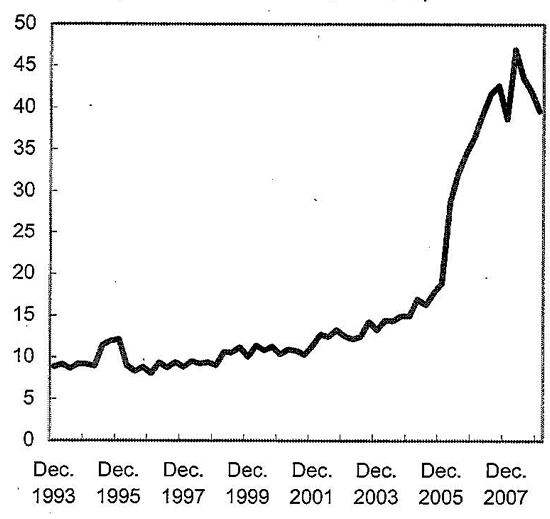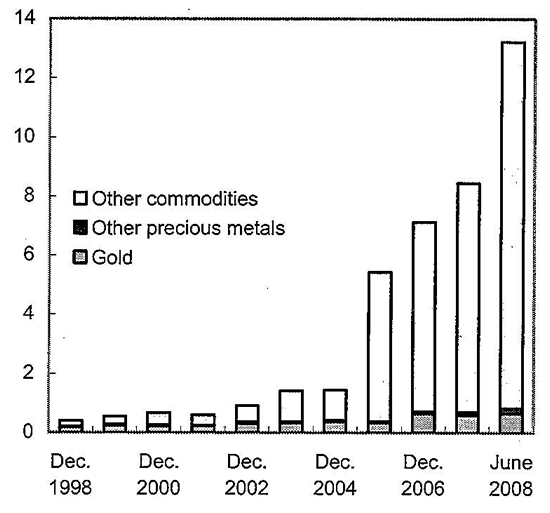Excessive profit-seeking by investors should not distort futures markets for vital goods, study recommends; greater transparency, more regulation urged
| EMBARGO The contents of this press release and the related Report must not be quoted or summarized in the print, broadcast or electronic media before 19 March 2009, 17:00 GMT (18:00 Geneva) |
Geneva, 19 March 2009 - A sharp jump in food prices in 2007-2008 - and a subsequent steep drop in those prices -- was driven in part by large-scale speculation by financial investors, a new UNCTAD report says.
The report calls for more transparency in futures markets for commodities such as food and petroleum. It also says regulators should have greater power to step in when such futures speculation -- which is aimed at profits for arbitrage investors rather than as a hedge to protect producers against normal price swings -- drives up prices for vital goods such as food.
The report (1) , titled The Global Economic Crisis: Systemic Failures and Multilateral Remedies, was released today. It was written by economists serving on UNCTAD´s Secretariat Task Force on Systemic Issues and Economic Cooperation in advance of several upcoming international conferences on the global economic crisis (see fig. 1 and fig. 2).
New research by UNCTAD finds that the growing role and weight of large-scale financial investors on commodities futures markets has affected commodity price volatility and that speculative bubbles have emerged for some commodities on some occasions, the report says.
This financialization of commodity markets has raised concern that the recent price developments - especially the steep increase in 2007-2008 and the subsequent strong reversal - were largely driven by financial investors´ use of commodities as an asset class, typically to diversify portfolios or hedge inflation risk. Given that food prices can be a matter of survival for millions of poor around the world, that sort of speculation should not be accepted, the report contends.
Observers who are sceptical of the link between speculation and commodity price developments hold that prices perfectly and instantaneously incorporate all relevant information on fundamental supply and demand conditions. UNCTAD finds no support for this view. There is an increasing number of commodity market participants who either base their investments on trend extrapolation and algorithms or on price signals from other financial markets. The positions of these financial investors are often very large, leading to changes which can have a "weight of money" effect that moves prices even without a relationship to actual demand in commodity markets for the actual goods to be sold.
Monitoring and possibly intervening in such developments will require regulatory changes and better information, the report says. Currently there is a lack of data on purchases of futures by category of investor. That makes it difficult to tell who is influencing prices. The report´s authors admit that the current lack of transparency makes it difficult to show empirically the exact link between speculation and commodity price developments. Nevertheless, UNCTAD says there are indications that "financial investors have been partly responsible for increasing at least some commodity prices during the recent boom, and speculative bubbles emerged for some commodities at least for short periods of time."
As early as June 2008, UNCTAD Secretary-General Supachai Panitchpakdi said in an address to the High-level Conference on World Food Security in Rome, "It is probably no coincidence that global food prices have surged in the wake of recent volatility in global finance sparked by last year´s collapse in the US sub-prime (mortgage) market. Speculators looking for assets with rising prices may well have sensed the strains in the world food markets and re-oriented their portfolios to buy food commodities. … If speculation did indeed play a leading role in the current price hike, it must be dealt with forcefully, and collectively."
In testimony before the United States House of Representatives Committee on Agriculture on 3 February 2009, Michael Greenberger, a respected observer of derivatives markets, said "evidence adduced since … September 2008 … has made it even clearer that excessive speculation in the unregulated energy and swaps markets has caused and continues to cause unnecessary and substantial volatility in the agriculture and energy markets."
In the wake of the current financial crisis which has spilled across markets and borders, the report calls for urgent regulatory reform. The availability of better data on commodities futures trading would provide regulators with early warning signals and allow them to recognize emerging commodity price bubbles. Related stepped-up regulatory authority would allow them to prevent bubble-creating trading behaviour from having adverse consequences for the functioning of commodity futures trading.
ANNEX
Figures
Figure 1 - Options contracts outstanding on commodity exchanges, December 1993 - December 2008 (Number of contracts, millions)
Source: BIS, Quarterly Review, March 2009, table 23B
Figure 2 - Notional amount of outstanding over-the-counter commodity derivatives, December 1993 - June 2008(Trillions of dollars)
Source: BIS, Quarterly Review, December 2008, table 19


